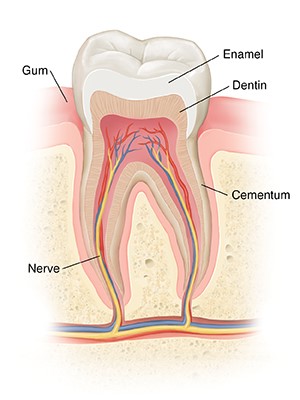Sensitive Teeth? 10 Ways to Stop Sensitivity in its Tracks

At Spokane Dental, your smile is our top priority. We understand that sensitive teeth can be a source of discomfort and concern, affecting your daily life and even your enjoyment of certain foods and beverages. In this blog post, we'll delve into the causes of sensitive teeth and provide you with valuable tips on how to combat this common issue. By the end, you'll be equipped with the knowledge to enjoy your favorite hot or cold treats without the pain of sensitivity.
Understanding Tooth Sensitivity
Battling tooth sensitivity begins with an understanding of what causes it in the first place. Tooth sensitivity occurs when the hard outer layer of enamel wears away and the dentin layer of your teeth becomes exposed. Dentin is made up of tiny tubules filled with nerve endings. When dentin is exposed, these nerve endings are triggered by hot, cold, sweet, or acidic stimuli, leading to pain or discomfort.
Common Causes of Tooth Sensitivity
Several factors can contribute to the exposure of dentin and the development of tooth sensitivity:
- Brushing Too Hard: Aggressive brushing can wear away tooth enamel and expose dentin. It's important to use a soft-bristle toothbrush and gentle brushing motions.
- Tooth Decay: Cavities and decay weaken tooth enamel, leaving dentin vulnerable to stimulation.
- Gum Recession: Receding gums expose the tooth's sensitive root surface, which lacks the protective enamel found on the crown.
- Tooth Grinding: Grinding or clenching your teeth can gradually wear down enamel and lead to sensitivity.
- Acidic Foods and Beverages: Consuming excessive acidic foods and drinks can erode enamel over time.
- Tooth Whitening: Some whitening products, when used excessively or incorrectly, can lead to temporary sensitivity.
10 Ways to Stop Tooth Sensitivity in its Tracks
Combatting tooth sensitivity is possible with a few lifestyle changes and dental care adjustments:
- Choose the Right Toothpaste: Select a toothpaste specially designed for sensitive teeth. These toothpaste brands typically contain desensitizing agents that help reduce sensitivity over time.
- Use a Soft Toothbrush: Opt for a soft-bristle toothbrush and gentle brushing motions. Brushing too hard can further erode enamel.
- Fluoride Mouthwash: Rinse with a fluoride mouthwash to strengthen enamel and reduce sensitivity.
- Avoid Acidic Foods and Drinks: Limit your consumption of acidic foods and beverages, such as citrus fruits, soda, and vinegar-based dressings. Prolonged exposure to acid can wear away enamel over time.
- Practice Proper Dental Hygiene: Maintain good oral hygiene practices by brushing twice a day and flossing daily to prevent gum disease and decay.
- Wear a Nightguard: If you grind your teeth at night, consider wearing a nightguard to protect your enamel.
- Visit Spokane Dental Regularly: Regular check-ups at Spokane Dental are essential to detect and address issues like tooth decay and gum recession early, preventing sensitivity.
- Prescription Toothpaste: If needed, Dr. Smith can prescribe a higher dose of fluoridated toothpaste to help treat sensitivity.
- Fluoride Treatments: Your Spokane Dental team can apply fluoride treatments to strengthen your tooth enamel, reducing sensitivity.
- Gum Graft Surgery: In cases of severe gum recession, we may recommend gum graft surgery to protect exposed tooth roots.
When to Seek Professional Help
While the tips above can help alleviate and prevent tooth sensitivity from home, it's important to consult Dr. Smith right away if:
- Pain persists: If you continue to experience sensitivity despite trying at-home remedies.
- Sensitivity is severe: If the pain is intense enough to disrupt your daily life.
- New sensitivity develops: If sensitivity suddenly appears, it could indicate an underlying dental problem that needs attention.
- You notice other dental issues: Loose teeth, swelling, or bleeding gums.
Your Spokane Dental team is your partner in oral health. We can identify the cause of your tooth sensitivity and recommend the most appropriate treatment to alleviate your discomfort.
Tooth sensitivity doesn't have to control your life or dictate what you can or cannot enjoy. By understanding its causes and following these tips, you can combat sensitivity and regain your pain free smile. To schedule an appointment today, call us at (509)822-5614.
Photo credit: https://api.kramesstaywell.com/Content/6066ca30-310a-4170-b001-a4ab013d61fd/medical-illustrations/Images/84673_1

